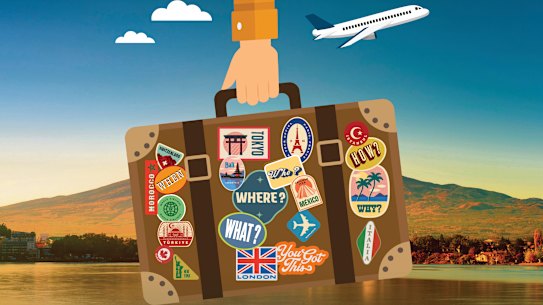
August 16, 2025 — 5:00am
Save
You have reached your maximum number of saved items.
Remove items from your saved list to add more.
Save this article for later
Add articles to your saved list and come back to them anytime.
Got it
This might sound scary, but there’s a good chance you’ve been using AI to help with your travel plans for quite some time now. Even if you didn’t realise it.
 Travel advice is at your fingertips.
Travel advice is at your fingertips.
Getty Images
If you’ve ever searched for flights or hotel stays via a website aggregator such as SkyScanner or Booking.com, then you’ve used AI. If you’ve interacted with a chatbot on a travel website, that’s AI. Even if you’ve just googled for potential destinations, your search has been powered by AI.
Artificial Intelligence is very much part of our world now, and for travellers it can be a handy guide to that world, with a host of tools out there to help you plan and execute your next holiday.
Start at the beginning: where do you want to go? Publications such as Traveller, of course, are ideal for expert advice from people who are on the ground, experiencing the world’s best travel destinations in person.
You can augment that knowledge, however, with some basic guidance. Using generative AI via “large language models”, or LLMs, such as ChatGPT, Gemini and Mistral, you can input the desired parameters for your holiday – say, “somewhere cold, with mountains, great food, cultural attractions, and not too expensive” – and you will be given a series of answers that will at least provide some inspiration.
 Learn to utilise AI for holiday planning.Greg Straight
Learn to utilise AI for holiday planning.Greg Straight
(The results for that search on ChatGPT, by the way, were Bulgaria and Slovenia – good calls – and Iceland and Norway, which are both notoriously pricey and not at all suitable. So, be careful.)
These LLMs can also help you plan an itinerary, particularly travel-specific AI sites such as PlanTripAI, or LaylaAI. Simply enter your destination, the sorts of things you’re interested in, the time you have to spend, and the bots will spit out all sorts of suggested itineraries.
They may not be perfect; in fact, they almost certainly won’t be. But you will be able to pick and choose and perhaps collect a few ideas you wouldn’t otherwise have had.
Next, the booking portion of your trip, which is probably the simplest to have magical bots lend you a helping hand.
Use aggregators such as those mentioned at the top of this story, or the likes of Kayak or Expedia, to search flights, accommodation and experiences. When you find what you like, either book through that site, or go to the individual providers’ websites to see if you can get a better deal by booking direct.
And finally, there are ways to harness AI when you’re on the ground, enjoying your holiday.
Google’s suite of apps is the leader here. Google Maps is an indispensable tool that will help you get around, tell you how busy certain routes are, give you 3D paths to follow, even tell you which carriage of a train to ride in for the easiest exit at your destination.
Google Translate is also invaluable in non-English-speaking countries, with real-time translations of menus and other signage via your phone’s camera, plus the ability to talk into your phone in English, and have it spoken back to you (or to someone near you) in the local language.
It’s scary, seeing how good it is. But also very handy.
Sign up for the Traveller newsletter
The latest travel news, tips and inspiration delivered to your inbox. Sign up now.
Save
You have reached your maximum number of saved items.
Remove items from your saved list to add more.
![]() Ben Groundwater is a Sydney-based travel writer, columnist, broadcaster, author and occasional tour guide with more than 25 years’ experience in media, and a lifetime of experience traversing the globe. He specialises in food and wine – writing about it, as well as consuming it – and at any given moment in time Ben is probably thinking about either ramen in Tokyo, pintxos in San Sebastian, or carbonara in Rome. Follow him on Instagram @bengroundwaterConnect via email.From our partners
Ben Groundwater is a Sydney-based travel writer, columnist, broadcaster, author and occasional tour guide with more than 25 years’ experience in media, and a lifetime of experience traversing the globe. He specialises in food and wine – writing about it, as well as consuming it – and at any given moment in time Ben is probably thinking about either ramen in Tokyo, pintxos in San Sebastian, or carbonara in Rome. Follow him on Instagram @bengroundwaterConnect via email.From our partners


